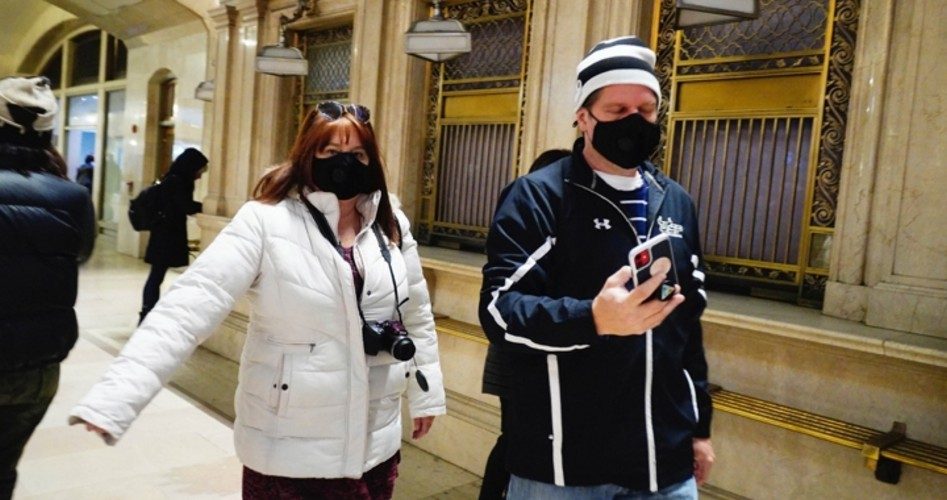
It appears that leading globalist health NGO’s want to encourage panic over the outbreak of the pandemic novel coronavirus, even as pundits and media organizations in the United States warn people not to hoard supplies. Case in point is the Coalition for Epidemic Preparedness Innovations (CEPI) a Norwegian NGO launched in 2017 at the World Economic Forum in Davos.
The organization describes itself as “an innovative global partnership between public, private, philanthropic, and civil society organizations working to accelerate the development of vaccines against emerging infectious diseases and enable equitable access to these vaccines for affected populations during outbreaks.”
The leader of CEPI is the organization’s CEO, Richard Hackett. Interviewed by the UK’s Channel 4 News, Hackett compared the COVID-19 pandemic to war.
“I don’t think it is a crazy analogy to compare this to World War II,” he said. The World Health Organisation is using those kinds of terms. They have seen what this virus is capable of doing.”
Specifically, what the virus is capable of doing, he said, is spreading rapidly while also having a death rate substantially higher than the flu. “I think the most concerning thing about this virus is the combination of infectiousness and the ability to cause severe disease or death. And we have not since 1918, the Spanish Flu, seen a virus that combined those two qualities in the same way.”
Channel 4 responded by questioning Hackett about his motives for using such strong language in his descriptions of COVID-19.
“What do you say to people who say you’re using these martial metaphors, you’re making it sound very scary, you have a vested interest in making people fearful so you get the investment in a vaccine. What do you say to that?” the Channel 4 news anchor asked.
“I’ve been working on epidemic preparedness for about 20 years and completely dispassionately without elevating the temperature or speaking hyperbolically,” Hackett responded. “This is the most frightening disease I’ve ever encountered in my career and that includes Ebola, it includes MERS, it includes SARS. And it’s frightening because of the combination of infectiousness and a lethality that is, that appears to be, manyfold higher than flu. At CEPI, we want to be utterly transparent about what we are doing. We actually are not trying to secure any resources for CEPIs functions. We are only trying to secure resources to make a COVID-19 vaccine.”
CEPI reports that it is, in fact, supporting at least three avenues of research into such a vaccine. These include, the organization says, support for the work being conducted by Inovio Pharmaceuticals, support for research into a vaccine platform being conducted at the University of Queensland, and support for Moderna Inc.’s vaccine research. Of these, Moderna developed its mRNA-1273 vaccine for the novel coronavirus in only 42 days and has already shipped it to the National Institute of Allergy and Infectious Diseases (NIAID) for a Phase 1 trial that is expected to begin soon.
Inovio, likewise, has developed a vaccine it calls INO-4800. “We plan to begin human clinical trials in the U.S. in April and soon thereafter in China and South Korea, where the outbreak is impacting the most people,” said Inovio President and CEO Dr. J. Joseph Kim. “We plan on delivering one million doses by year end with the existing resources and capacity.”
While Hackett and CEPI can’t be accused of stoking fear over the coronavirus as a means to pad their paychecks, there are other reasons, conceivably, to push frightening narratives, especially for globalist NGOs that generally prefer centralized command and control governance over decentralized, limited government approaches.
And, in fact, Hackett praised the command and control methods of Communist China in confronting the virus during his interview with Channel 4, but he criticized the decentralization and supposed “injustices and inequities” of the U.S. healthcare system.
“I’m very concerned about the situation in the United States,” Hackett said. “The U.S. is a big country, it’s decentralized, it doesn’t have a unified national health system, it doesn’t have a unified national public health system. CDC is a marvelous institution, but a lot of the actual management of public health problems is delegated down to sates and local communities and I am concerned that the embedded injustices and inequities in the American system will play out, that the virus will hit vulnerable Americans, it will hit Americans who don’t have access to health care, it will hit Americans who don’t have health insurance, it will hit Americans who actually depend on the school system to provide for meals for their children in a terrible way.”
“War,” said Randolph Bourne, “is the health of the state;” an aphorism that has proven all too true time and again. A war on a pandemic, as described by Hackett, is no different. While we must be aware of the threat posed by the novel coronavirus, we similarly must guard our liberties, as we should be eager to lose neither our lives nor our freedoms.
Photo of people wearing masks to protect themselves from coronavirus in New York City: AP Images



